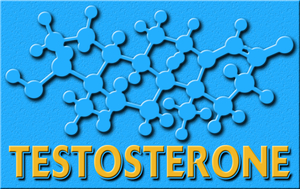 Testosterone is the quintessentially male hormone, intrinsically connected to the ideas of masculinity and manhood.
Testosterone is the quintessentially male hormone, intrinsically connected to the ideas of masculinity and manhood.
Testosterone provides men with a variety of potent benefits.
It's associated with lean muscle mass and reduced body fat. Testosterone and its precursors are the building blocks of sperm, the source of male fertility. Men require Testosterone to be in peak physical and psychological condition.
Video Link: https://vimeo.com/290610713
Video Download: Click Here To Download Video
Video Stream: Click Here To Stream Video
What many (or even most) people don't recognize is that Testosterone is intrinsically vital to feminine health as well.
Both men and women produce Testosterone and Estrogen naturally, though in vastly different quantities. Men produce ten times as much Testosterone as women and only 1/10th as much Estrogen.
Dr. Felice Gersh is a gynecologist from Irvine, California, the creator of the Integrative Medical Group. Her opinions actively inform the content of this article.
The Effect of Testosterone on Muscle Mass
Testosterone is a potent anabolic hormone and is the reason why men put on muscle as quickly as they do, and the reason why men have a lower body fat percentage on average compared to women.
Even if a boy and girl were treated identically from birth — fed the same foods, engaging in the same activities, etc. — the onset of puberty would lead to dramatic changes in the boy's muscle mass, as a direct result of the influence of Testosterone.
On the other hand, Testosterone still plays a substantial role in shaping the female form and does influence muscle development in women as well.
Because women produce so much less Testosterone than men, the effects of Testosterone Deficiency can be even more pronounced on the physiological form, leading to frailty in both muscle and bone tissue.
These low Testosterone Levels are the reason why women are so prone to osteoporosis, while it's a far lesser concern for men.
How Does Low Testosterone Affect Aging Women?
Women are highly susceptible to issues with frailty as a result of the feminine physiological structure. As women age, they are highly prone to problems with mobility, flexibility, and diminished bone and muscle mass.
Sadly, all of these factors impair the ability of aging women to make the most of their lives. For this reason, maintaining healthy feminine Testosterone Levels is essential to ward off some of the worst aspects of aging in women.
When Does Low-T Become a Problem for Women?
Women lose Testosterone Production at a faster rate than men. Men lose 1-2% of their Testosterone annually beginning around age thirty. Women experience a much more dramatic drop in Testosterone Production.
By the time a woman is forty, she produces only half as much Testosterone as she did at age twenty. It's usually around age 40 when the effects of declining Testosterone Levels can become apparent.
Birth Control Can Lower Testosterone Levels
Even younger women can  be impacted by suppressed Testosterone Levels.
be impacted by suppressed Testosterone Levels.
More than 25% of women in the United States take birth control pills. While Birth Control provides some clear and distinct benefits to women, it also affects the body's ability to produce Testosterone.
This is because birth control diminishes levels of Sex Hormone Binding Globulin in the bloodstream.
SHBG is responsible for absorbing and distributing Testosterone and Estrogen through the blood because SHBG Levels fall while on Birth Control Pills, this impairs the body's ability to get Testosterone where it needs to go to provide its benefits.
Testosterone and Sex Drive in Women
Like other Hormones such as Serotonin, Leptin, and Human Growth Hormone, Testosterone has receptors distributed throughout various systems of the human body.
Also, like these other hormones, Testosterone provides vastly different benefits dependent upon where in the body that the hormone is activated. For example, Testosterone has powerful effects on psychological, cardiovascular, and sexual health.
Everyone knows that Testosterone is essential for sexual desire, pleasure, and ability among men, but the same is true for women as well. In fact, without Testosterone, women would be unable to function sexually, just like men.
Testosterone not only stimulates sexual desire in women, but it also encourages lubrication and sexual readiness, as well as activating sensitivity and pleasure centers.
Testosterone, Emotional Well-Being, and Cognitive Function
While we readily think of the anabolic effects of Testosterone on our muscles, the  hormone also plays a similar role in our brains.
hormone also plays a similar role in our brains.
Testosterone Deficiency in both sexes is strongly linked to depression and mood disorders.
Among women, low Testosterone Levels are associated with feelings of ambient sadness and anxiety which suppress wellness and emotional health. Testosterone has also shown to have a high correlation with cognitive performance and memory in women.
There have been studies conducted where women undergo Testosterone Supplementation, and these studies do appear to show promising benefits in the areas of mood and cognition.
Testosterone Deficiency also leads to fatigue, which not only contributes to physical frailty but psychological function as well.
People with low energy are naturally more prone to diminished focus and impaired mood balance. Low Testosterone in women is strongly correlated with reduced well-being and quality of life.
The Future of Testosterone Replacement Therapy for Women
As of today, there are no FDA-Approved Testosterone Therapy formulations for women. Some Hormone Clinics provide proprietary Testosterone Regimens for women interested in restoring healthy Testosterone Levels.
Testosterone is commonly paired with other Hormone Treatments designed to relieve the symptoms of menopause.
In the coming years, it's likely that research will produce clinical guidelines for female Testosterone Supplementation and more options for treatment.
Reference
Increasing women’s sexual desire: The comparative effectiveness of estrogens and androgens
Contact Us Today For A Free Consultation

- Testosterone for Women [Last Updated On: December 1st, 2023] [Originally Added On: December 29th, 2013]
- Testosterone Androgen [Last Updated On: December 11th, 2023] [Originally Added On: December 29th, 2013]
- Testosterone and Body Building [Last Updated On: December 14th, 2023] [Originally Added On: December 30th, 2013]
- Testosterone Levels [Last Updated On: December 6th, 2023] [Originally Added On: December 31st, 2013]
- Testosterone Gel, Cream, and the Testosterone Patch [Last Updated On: November 28th, 2023] [Originally Added On: December 31st, 2013]
- Buy Testosterone | Types of Testosterone Replacement Therapy Programs, Injections, Cream and Gel [Last Updated On: December 13th, 2023] [Originally Added On: December 31st, 2013]
- Buy Testosterone Injections Online, Testosterone Prescription for Low T, Testosterone Replacement Therapy [Last Updated On: October 16th, 2020] [Originally Added On: January 1st, 2014]
- Aging and Testosterone Replacement Therapy [Last Updated On: December 12th, 2023] [Originally Added On: January 3rd, 2014]
- What Causes Low Testosterone [Last Updated On: December 10th, 2023] [Originally Added On: January 7th, 2014]
- Hormone Levels in Men [Last Updated On: December 4th, 2023] [Originally Added On: January 12th, 2014]
- Hormone Level Testing [Last Updated On: November 29th, 2023] [Originally Added On: January 13th, 2014]
- Types of Testosterone Products and Delivery [Last Updated On: December 8th, 2023] [Originally Added On: January 22nd, 2014]
- Testosterone Therapy Helps Men with Low-T Ward Off Prostate Cancer [Last Updated On: May 29th, 2024] [Originally Added On: December 29th, 2019]
- The Importance of Dietary Fat for Testosterone Production [Last Updated On: July 8th, 2024] [Originally Added On: January 2nd, 2020]
- Testosterone Deficiency and Low-T at Epidemic Levels Among Men in the United States [Last Updated On: May 27th, 2024] [Originally Added On: May 17th, 2020]
- The Effects of Testosterone Therapy on Male Patients -- Who Should Use Testosterone? [Last Updated On: December 20th, 2023] [Originally Added On: June 16th, 2020]
- Does Ibuprofen Contribute to Low Testosterone? [Last Updated On: January 27th, 2024] [Originally Added On: June 20th, 2020]
- The Link Between Testosterone and Lower Rates of Autoimmune Diseases Among Men [Last Updated On: January 30th, 2024] [Originally Added On: June 21st, 2020]
- Weight Cycling and the Problem with Crash Dieting [Last Updated On: April 8th, 2024] [Originally Added On: July 30th, 2020]
- Reexamining Bio-Identical Testosterone Therapy [Last Updated On: June 18th, 2024] [Originally Added On: August 12th, 2020]
- Understanding how Muscle and Fat Impact Body Mass, Weight, and Health [Last Updated On: April 15th, 2024] [Originally Added On: August 25th, 2020]
- The Role of Nitric Oxide in Cancer Proliferation And Prevention [Last Updated On: May 3rd, 2024] [Originally Added On: August 26th, 2020]
- Understanding Heartburn in the 21st Century [Last Updated On: April 24th, 2024] [Originally Added On: August 28th, 2020]
- What is Erectile Dysfunction? [Last Updated On: April 20th, 2024] [Originally Added On: August 30th, 2020]
- Sermorelin Acetate Drug Information [Last Updated On: April 7th, 2024] [Originally Added On: August 31st, 2020]
- Exercise and Mental Health [Last Updated On: April 5th, 2024] [Originally Added On: September 1st, 2020]
- The Importance of Proteins, Carbs, and Fats [Last Updated On: March 11th, 2024] [Originally Added On: September 2nd, 2020]
- Low-T Treatment Before and After -- How Testosterone Therapy Improves Vitality [Last Updated On: April 9th, 2024] [Originally Added On: September 6th, 2020]
- Changes to LabCorp Guidelines for Low-T Diagnosis and How They Impact Your Treatment [Last Updated On: July 14th, 2024] [Originally Added On: September 22nd, 2020]
- The Effects of Testosterone on Asthma Prevalence Among Men and Women [Last Updated On: February 19th, 2024] [Originally Added On: October 6th, 2020]
- 7 Exercises to Elevate Testosterone Levels [Last Updated On: June 13th, 2024] [Originally Added On: October 10th, 2020]
- Vitamin A is Essential for Good Health - Are You Getting Enough ? [Last Updated On: April 16th, 2024] [Originally Added On: October 14th, 2020]
- Testosterone and Diet – How to Support Testosterone Levels with Healthy Eating [Last Updated On: June 7th, 2024] [Originally Added On: October 29th, 2020]
- The Significance of Telomeres in Stem Cell Treatments [Last Updated On: March 16th, 2024] [Originally Added On: November 27th, 2020]
- The Influence of Testosterone on Protective Mating Behaviors in Men [Last Updated On: January 25th, 2024] [Originally Added On: December 6th, 2020]
- Testosterone Promotes Bone Health and Can Help Treat Osteoporosis [Last Updated On: February 15th, 2024] [Originally Added On: December 17th, 2020]
- The Relationship Between Testosterone and Cortisol [Last Updated On: April 2nd, 2024] [Originally Added On: December 19th, 2020]
- The Importance of Sex Hormone-Binding Globulin (SHBG) for Healthy Testosterone Levels [Last Updated On: March 9th, 2024] [Originally Added On: December 28th, 2020]
- 12 Health Issues That Can Kill Libido and Limit Sexual Performance [Last Updated On: May 23rd, 2024] [Originally Added On: January 3rd, 2021]
- 4 Foods to Boost Your Testosterone Levels [Last Updated On: February 7th, 2024] [Originally Added On: January 4th, 2021]
- Low Testosterone Symptoms [Last Updated On: December 31st, 2023] [Originally Added On: January 7th, 2021]
- Is Male Menopause Real? The Science of Andropause [Last Updated On: January 15th, 2024] [Originally Added On: January 11th, 2021]
- Relieve Fatigue and Increase Energy with Testosterone Replacement Therapy [Last Updated On: January 16th, 2024] [Originally Added On: January 16th, 2021]
- How to Administer a Testosterone Injection -- Low-T Injection Guide [Last Updated On: February 28th, 2024] [Originally Added On: January 17th, 2021]
- Testosterone Levels Associated with Serotonin Activity in the Brain [Last Updated On: March 26th, 2024] [Originally Added On: January 19th, 2021]
- Grumpy Old Man Syndrome – Causes and Treatments [Last Updated On: June 8th, 2024] [Originally Added On: January 22nd, 2021]
- The Effects of Beer on Testosterone Production and Gynecomastia [Last Updated On: March 21st, 2024] [Originally Added On: January 30th, 2021]
- Testosterone Frequently Asked Questions [Last Updated On: February 6th, 2024] [Originally Added On: February 26th, 2021]
- Testosterone Supplements: Vitamin and Amino Acid Pills Versus Real Testosterone [Last Updated On: November 21st, 2024] [Originally Added On: March 1st, 2021]
- Testosterone Side Effects, Risks, Dangers and Negative Effects [Last Updated On: November 7th, 2024] [Originally Added On: March 2nd, 2021]
- Testosterone for Men [Last Updated On: February 20th, 2024] [Originally Added On: April 13th, 2021]
- Testosterone Testing [Last Updated On: November 9th, 2024] [Originally Added On: May 7th, 2021]
- Hormone Replacement Therapy: Commonly Asked Questions [Last Updated On: February 20th, 2024] [Originally Added On: June 16th, 2023]
Word Count: 928





















